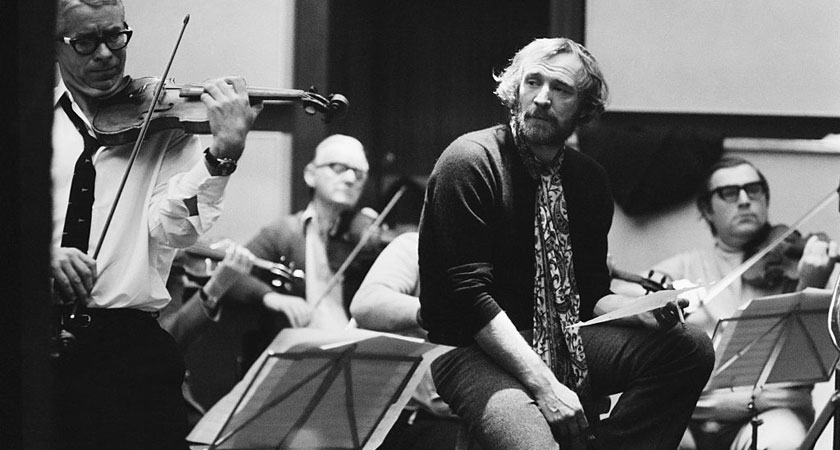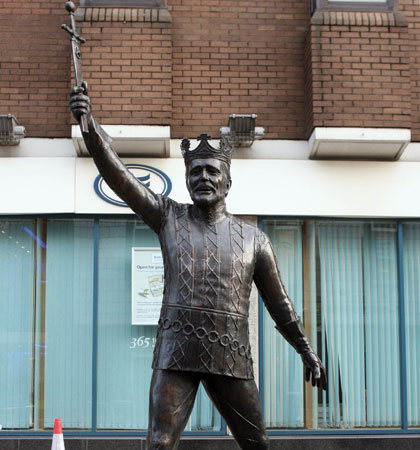BORN in Limerick on October 1, 1930, Richard St John Harris was one of eight children born to Ivan Harris, a flour mill owner, and his wife Mildred Josephine Harty.
After spending his formative years in Limerick, he relocated to London to fulfil his acting ambitions.
After his big break in This Sporting Life, he was a regular fixture on the big screen throughout the 1960s and '70s, although was almost as well known for his hellraising during this time as for his acting ability.
His career floundered somewhat in the 1980s but he returned to form in The Field in 1990, which earned him a second Oscar nomination.
He then became known to a new generation of fans when he played Albus Dumbledore in the first two Harry Potter films – a role he rejected three times.
The second of those, Harry Potter and the Chamber of Secrets, was his last live action feature film and was released in November 2002, just weeks after he had passed away.
Here are 10 facts about the legendary Irish actor.
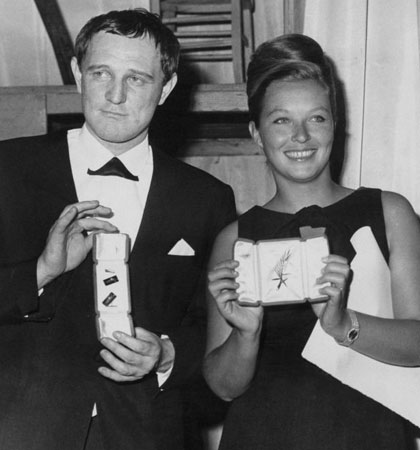 Harris in Cannes in 1963 after winning the Best Actor award for This Sporting Life, alongside Best Actress winner Marina Vlady (Image: Keystone / Hulton Archive / Getty Images)
Harris in Cannes in 1963 after winning the Best Actor award for This Sporting Life, alongside Best Actress winner Marina Vlady (Image: Keystone / Hulton Archive / Getty Images)He could have played rugby for Ireland
A talented rugby player, Harris played alongside Keith Wood’s father Gordon at Crescent College in Limerick and represented Munster Schools and Munster Under-20s.
He also played for Garryowen and was tipped to play for Ireland, but his hopes of playing professionally were curtailed after he developed tuberculosis as a teenager.
As well as rugby, he was also an accomplished racquetball player, winning the Tivoli Cup in Kilkee, Co. Clare an unsurpassed four years in a row (1948-51).
Harris would later portray a rugby player on screen in his breakthrough role, that of bellicose rugby league star Frank Machin in This Sporting Life (1963), which saw him nominated for an Oscar.
He also played a footballer in 1971 film Bloomfield.
He blagged his way to his first stage role
While recuperating from TB, he spent his time reading, developing a love of the arts.
Originally having ambitions to be a director, he instead turning his attention to acting.
He moved to England in 1954, studying at The London Academy of Music and Dramatic Art after being turned down by RADA.
He then joined Joan Littlewood's Theatre Workshop and made his stage debut in Brendan Behan’s The Quare Fellow at the Theatre Royal in 1956.
The character he played, Mickser, is a 50-year-old man, but that didn't stop Harris, then 25, from blagging an audition.
He got the audition and the part.
He was a man of many talents
It wasn’t just at acting where Harris excelled.
Multi-talented, he also released several albums, including The Richard Harris Love Album, as well as singles from his movies.
His seven-minute long single MacArthur Park (1968) was an unexpected a hit, reaching number 4 in the British charts.
In 1973, he released a book of poetry – I, In the Membership of My Days.
That same year he won the Grammy for Best Spoken Word Recording for his audiobook of Richard Bach’s novella, Jonathan Livingston Seagull.
Harris also fulfilled his early directorial ambitions by helming Bloomfield, in which he played an Israeli football star.
He received threats from Loyalists… and Republicans
In the biography Behaving Badly, Cliff Goodwin says that in 1970, Harris was a target for Loyalist paramilitaries who believed he was sympathetic to the IRA.
Harris himself later claimed he was a target for the IRA itself over his bid to curb fundraising for the organisation in the US, telling a libel hearing in 1988: “Someone has to make a stand against the IRA. The killing must stop. I've had six threats on my life so far this year and now they will start again because of what I am saying."
Harris would in fact play a fundraiser for the IRA in 1992 film Patriot Games (1992) and also played an IRA member in Shake Hands With the Devil (1959) and A Terrible Beauty (1960).
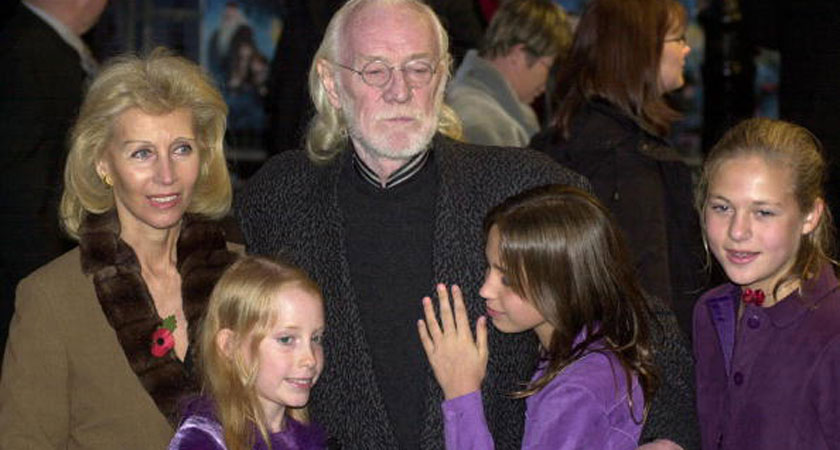 Harris and family at the world premiere of Harry Potter and the Sorcerer's Stone in London in 2001 (Image: NICOLAS ASFOURI / AFP / Getty Images)
Harris and family at the world premiere of Harry Potter and the Sorcerer's Stone in London in 2001 (Image: NICOLAS ASFOURI / AFP / Getty Images)He almost didn't play Dumbledore
Harris was vocal about his pride in his nationality, Goodwin saying that he once told the Sunday Times: “I’m proud to be called an Irishman. Why not? I’m not ashamed.”
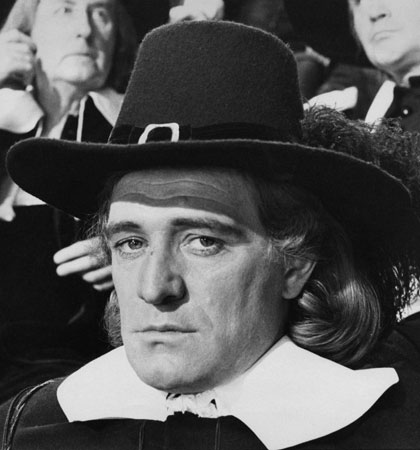 Harris in the title role in Cromwell (Image: Ted West / Central Press / Hulton Archive / Getty Images)
Harris in the title role in Cromwell (Image: Ted West / Central Press / Hulton Archive / Getty Images)Despite this, he portrayed one of the most notorious figures in Irish history, Oliver Cromwell, in a 1970 biopic.
Harris earned his second Oscar nomination for his portrayal of Bull McCabe in The Field (1990), an Irish film based on John B Keane’s play, which was in turn inspired by the real-life murder of Moss Moore.
The actor turned down the role of Albus Dumbledore in the Harry Potter movies three times, only relenting when his 11-year-old granddaughter threatened never to speak to him again if he didn’t take the part.
After his death, he was replaced by fellow Irish actor Michael Gambon.
Harris also won acclaim for his roles in A Man Called Horse (1970) and The Wild Geese (1978) and had minor but memorable roles in Unforgiven (1992) and Gladiator (2000).
He was a real life knight
While Harris missed out on two Oscars, he did win the Best Actor Award at Cannes for This Sporting Life and landed a Best Actor Golden Globe for Camelot (1967).
The accolades didn't stop there.
Having played King Arthur in Camelot, Harris became a real life knight after he was invested into the Venerable Sovereign Order of Saint John, Knights of Malta in 1981, and was knighted by the Queen of Denmark in 1985.
He went to buy a paper and was gone for two weeks
Renowned for his drinking and hellraising, especially with pals Richard Burton and Peter O’Toole, Harris eventually gave up drugs and alcohol, save for the occasional Guinness later in life.
After arriving at Leeds, he is said to have put a brick through someone’s window before asking to be put up for the night.
Harris recounted one tale to Gay Byrne of how he once left his house in London to get a newspaper, before returning two weeks later after a drinking binge in Dublin.
When his wife answered the door, he asked her: “Why didn’t you pay the ransom?!”
He was never the shy, retiring type
Just as there are many stories of his drinking escapades, there are numerous tales of his fiery temperament, which didn’t appear to dim as he got older.
At the age of 70, he was drinking in the Coach & Horses in Soho when an Irish girl accosted him for not giving back to Limerick.
His son Jared Harris relayed the story to the Telegraph: “‘I really am a very forgiving man,’ he said to her. ‘I can forgive ignorance, and I can even forgive rudeness, but I can’t forgive ugliness and you are the ugliest woman I have ever seen, now f*** off.’”
Her boyfriend then intervened. “As Dad was standing up he sucker-punched the boyfriend and knocked him out,” said Jared.
“Then the woman started running around shouting ‘Dickie Harris has killed my boyfriend!’ and Dad took his Guinness and chucked it into the young man’s face. When he came round he said: ‘He’s not dead.’”
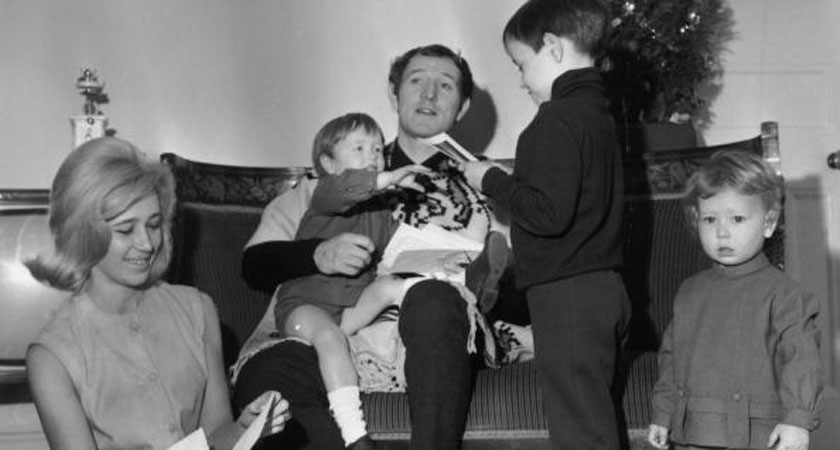 Harris with his wife Elizabeth and sons Damian, Jared and Jamie just before Christmas 1964 (Image: Evening Standard / Getty Images)
Harris with his wife Elizabeth and sons Damian, Jared and Jamie just before Christmas 1964 (Image: Evening Standard / Getty Images)Showbusiness runs in his family
Jared as well as Harris’ other two children all followed their father into showbusiness.
Jared and Jamie are actors, while Damian is a director and screenwriter.
Jared has appeared in Lincoln (2012) with Daniel Day-Lewis and in the TV series Mad Men, while Jamie had roles in In the Name of the Father (1993) and The Prestige (2006).
Harris’ niece, Annabelle Wallis, played the role of Grace in TV series Peaky Blinders.
There are doubts over his final resting place
He died on October 25, 2002 after being diagnosed with Hodgkin’s Disease two months earlier.
Harris was originally expected to be buried at Mount St Lawrence in Limerick, but his family instead revealed he had been cremated and his ashes were scattered at his luxury home in the Bahamas.
In his updated biography Sex, Death and the Movies, close friend Michael Feeney Callan says this was “a joke at the taxman’s expense” and there were rumours he had his ashes smuggled back to Limerick.
Whatever the truth, there are two permanent memorials to Harris in his home country – a statue in Kilkee, Co. Clare of him playing racquetball and another in the centre of Limerick in the role of King Arthur in Camelot.

